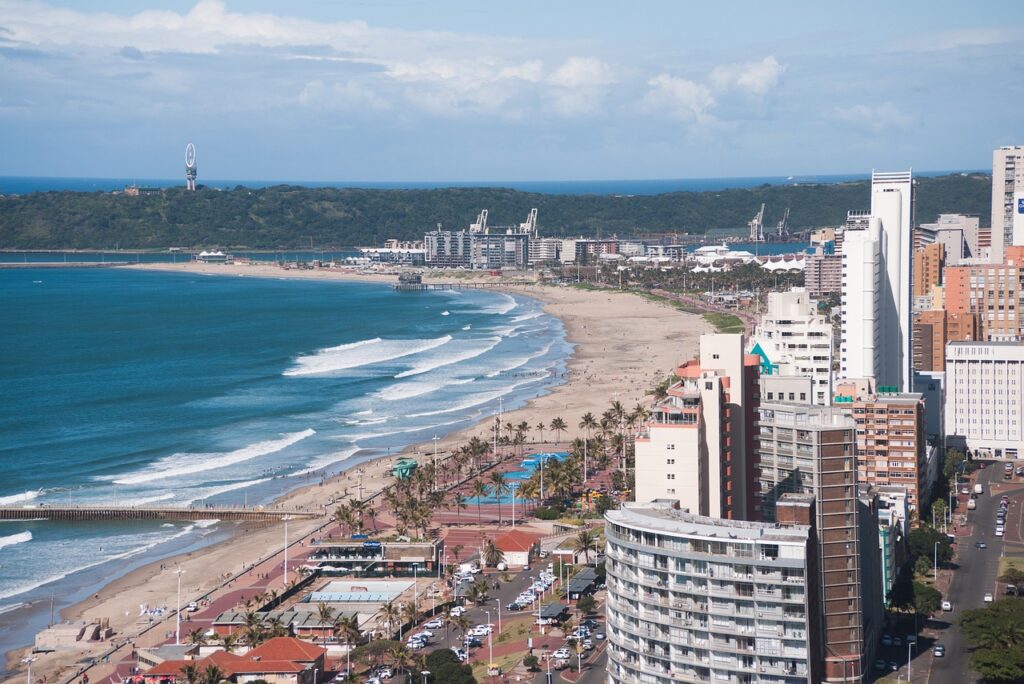Blog
International Removals to Durban, South Africa

Durban is the third-largest city in South Africa, after Johannesburg and Cape Town, and one of the fastest growing too. Here Hamiltons Removals, who offer high-quality international removals to Durban, look at the history of the city, its current facilities, and why we can help you (or your business) move there.
The History and Heritage
The Durban area was populated for hundreds of thousands of years by hunters and farmers before it became a modern, thriving city. It was part of the Zulu Nation before it was colonised by Europeans in the early 19th Century; its name comes from Sir Benjamin D’Urban, who was the governor of the surrounding Cape Colony at the time.
The city, which is on the country’s east coast, is the main seaport of South Africa, and is the main point of entry for its raw materials and industrial equipment. Minerals, coal, grain and sugar are all major exports (Durban is the home of the South Africa’s sugar refining industry).
Perhaps not surprisingly, the port is the city’s major employer; not just directly, but also through ancillary industries such as haulage, shipping logistics and transportation. Tourism is also an important contributor to the city’s economy, as there are several game reserves surrounding the city as well as plenty of beaches.
Getting There and Getting Around
Durban’s main airport, King Shaka, is now located at La Mercy, just over 20 miles to the north of the city; this was completed in 2010, just in time for the FIFA World Cup which was held in the country (it replaced Durban International Airport). Domestic and international airlines operate from here.
The best way to get into the city centre is via a shuttle bus or taxi. Three main bus companies operate in the city – People Mover, Mynah and Aqualine; weekly coupons are usually better value for money than an individual ticket. Minibus taxis are cheaper than their metered equivalents, but they are noisier and rowdier (the drivers on most play loud music).
You can hire a car, but it’s not recommended if you are travelling in or near the central business district – there are a lot of traffic jams during the day, and it can be unsafe at night. The general advice is to keep your doors locked if you are driving after dark.
The Main Attractions
Durban is famous for The Golden Mile, a series of beaches which stretch along its Indian Ocean coastline – if you can, visit them off-season as they can get very busy, particularly at Christmas.
As well as the aforementioned nature reserves, the city also has a 37-acre Botanic Garden, an oasis of calm in a thriving city. As well as being home to hundreds of sub-tropical plant species, it also hosts plant fairs and musical concerts. And if you prefer your nature to be of the winged variety, visit the Umgemi River Bird Park.
History-lovers should check out the Phansi Museum, which boasts one of the most extensive collections of South African art collections in the world. If you are a sports fan, then the Kingsmead cricket ground regularly hosts Test matches and one-day internationals.
Eating Out and Shopping Around
There’s plenty of seafood on restaurant menus – sardines are a particular speciality from May to July. Another favourite dish, which is often enjoyed as a takeaway, is the bunny chow or kota. This is a quarter loaf of bread which has been hollowed out and filled with a curry mixture (although vegetarian options are also available).
Durban is quite a cosmopolitan city (many residents have English or Indian ancestry, reflecting the migration from these two countries) so you should be able to find the cuisine of your choice.
If you are looking for somewhere to shop, then there are plenty of shopping malls with all the big names; the Musgrave Centre in the Berea district of the city, the Pavilion in Westville and The Gateway in Umhlanga are probably the biggest and best known. For something a bit different, try the Indian Quarter on the western side of the city centre; the Victoria Street Market is full of artisan goods.
International Removals to Durban with Hamiltons Removals
If you are considering domestic or commercial removals to Durban, then Hamiltons Removals can help. We offer either a dedicated shipping service, where you have sole use of your own container; a groupage option, where you share the container with other people; and air freight, for smaller and valuable items. We also help with overseas moves to all parts of South Africa, including Johannesburg, Cape Town, Port Elizabeth and the other major cities. For more information follow this link.
New Job, New House – Factors to Consider

If you have accepted a new job in a different town, city or even country, one of the many things you will have to consider is finding a new home. East Anglia removal firm Hamiltons Removals can help with moves to all parts of the UK and overseas; here are our top tips if you have to deal with these two big life events at the same time.
Talk to Your New Employer – and Colleagues
Check if your new employer offers any relocation packages. Remember it is in their interests to help you out – a settled employee is also a happy (and more productive) employee. If you are moving within the same firm, maybe as a promotion, this set of circumstances may be more likely to apply.
You should also try to meet your new colleagues beforehand. Not only will it help break the ice socially, and save time on your first working day, they may well be able to offer advice on the best areas to move to and tips on settling in the area.
Plan Well Ahead
Your current job may well require you to give a month’s notice (or more) – so make sure you use it wisely. Local estate agents, like future colleagues, may be a help – they will give you more of an idea of the local area than a simple internet search.
You should try to spend every non-working day or spare weekend productively. This doesn’t necessarily mean looking at new homes, just getting an idea of the area’s transport links, shops, schools, doctor’s surgeries and other facilities.
Consider Renting
It may be worth while opting for a short-term let, particularly if you have a probationary period to undergo with your new employer. Once this period is over and you have settled in then you might want to start looking for somewhere more permanent to live.
However, going down this route could create a problem – do you keep your current home, or do you sell it if your finances won’t stretch that far? In such a scenario, it may be worth while putting some of your bigger items such as furniture into storage.
Create a Moving Checklist
Assuming you have identified somewhere to live, you should create your own moving checklist and tick items off as you deal with them. Ideally, this should be separate from any job-related checklist (although there may be some overlap).
At least a month before you move, you should start getting removals estimates and talk to your chosen firm (hopefully us!). Two weeks beforehand, start thinking about utilities – electricity, gas or oil, water and increasingly important these days – phone and internet. Contact your existing supplier and see what arrangements you need to make regarding final readings and any connections to your new address.
Remember there are a whole host of other people to inform – your new local council and your nearest GP surgery, your bank and the DVLA (to register your new address) if you hold a driver’s licence.
A week before your move, you ought to think about starting to pack up items; a methodical approach, taking it room by room, is usually the best way to ensure nothing is missed out.
On the Day
Have a small box or bag of essentials to hand on moving day. This should contain food or drink, favourite toys for children (and pets), and a folder with any relevant or important documents. Don’t forget to drop the keys off with estate agents; and give yourself plenty of time for cleaning (your old home as well as your new one).
Talk to East Anglia Removal Firm Hamiltons Removals
At Hamiltons we have plenty of experience in helping people move at the same time as changing their jobs. We can help with moves to all parts of the UK, as well as overseas. We also help with commercial moves (and are happy to relocate businesses and staff at the same time).
We will be able to take a lot of the stress out of moving – which you may appreciate as it will allow you to spend more time focusing on your new job. For instance, if you are short of time, then we can offer a packing and unpacking service. Not only will your items be professionally packed, minimising the risk of breakages, we also use our own high-quality packing materials (including bespoke cartons for pictures and clothes).
If you are renting or opting for a short-term move, then we have two Safe N Stored self-storage sites on the Norfolk/Suffolk border – one at Harleston and another at Aldeby. Here can store all your personal possessions (the Aldeby site can accommodate caravans, motorboats and other larger items); both sites are protected by CCTV cameras, so you don’t need to worry about security.
If you would like to know more about any of our UK moving services, follow this link; for overseas moves, click here. You can also call us on 01379 855203.











